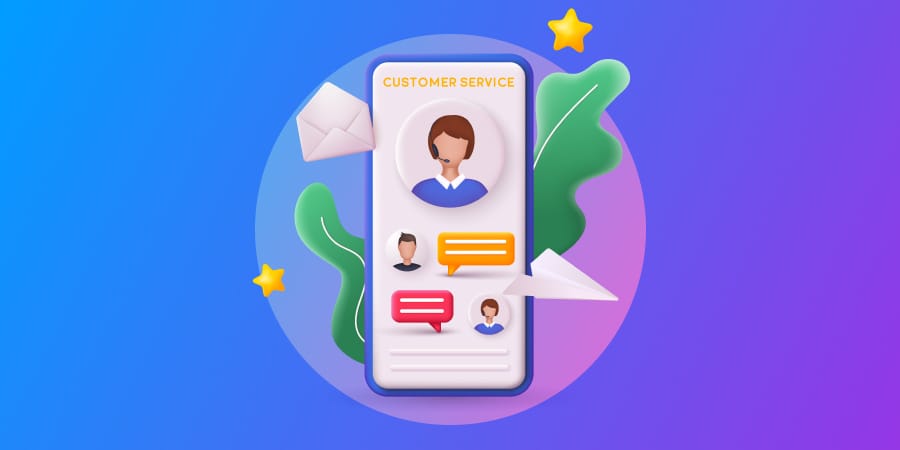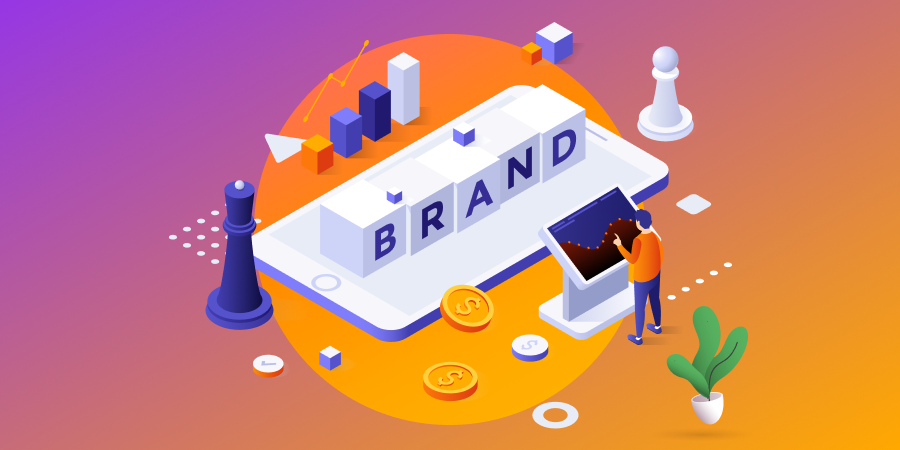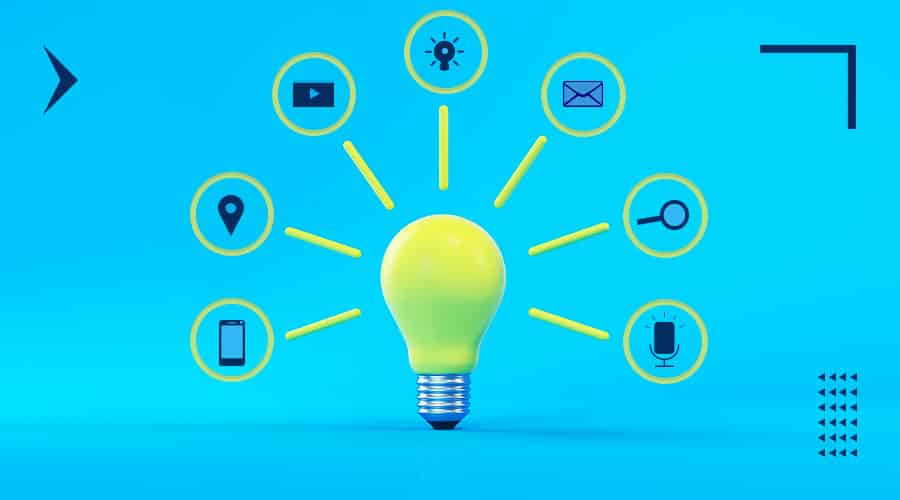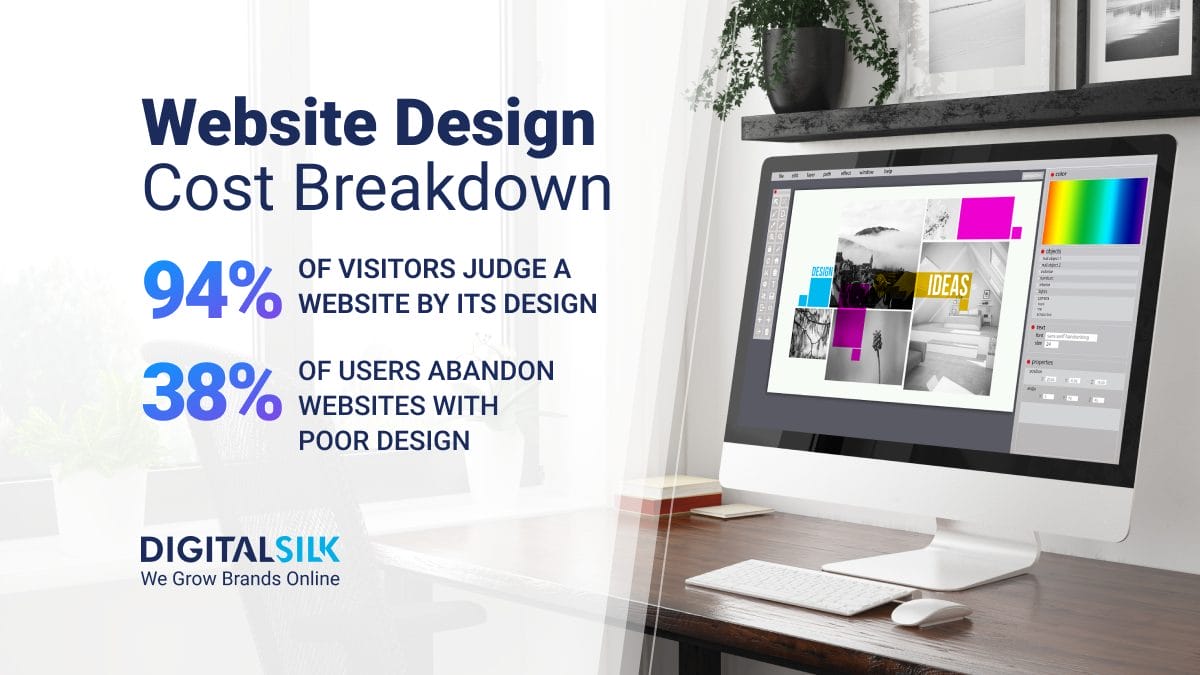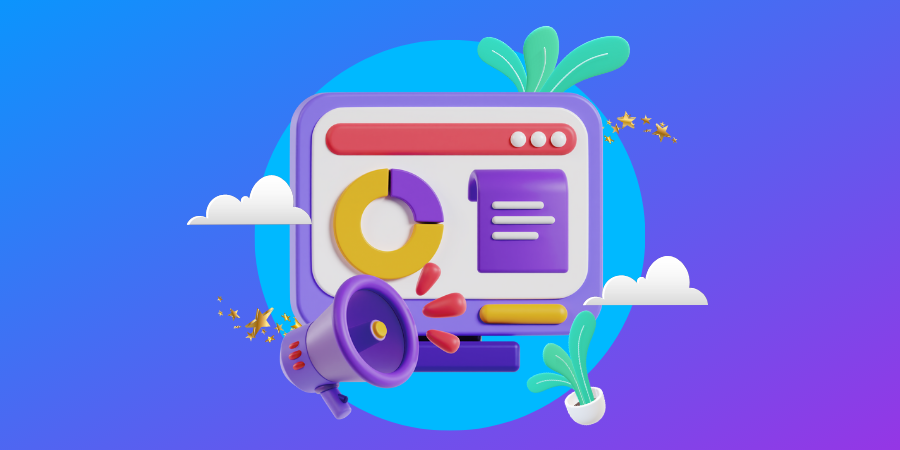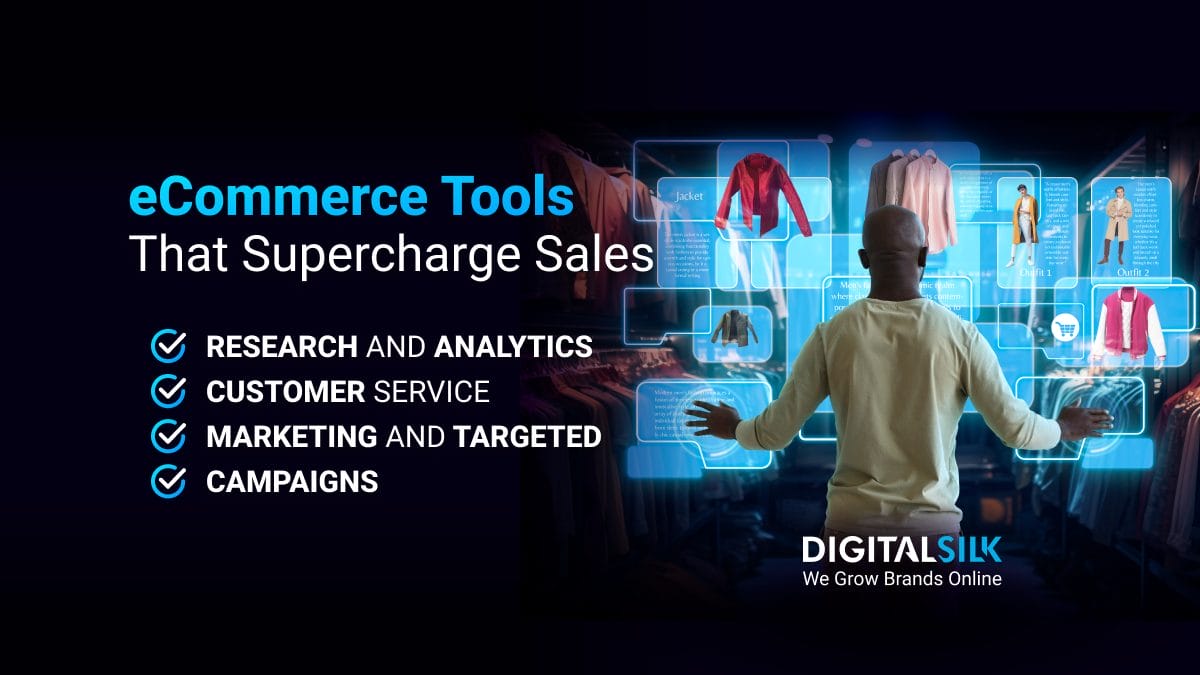74% of B2B marketers consider content to be the most effective way of attracting leads to the sales funnel, according to Content Marketing Institute (CMI).
But this is only one of many strategies for lead generation.
Here, we’ll break down 20+ tactics, strategies and techniques that will help you generate more qualified leads and drive more sales in 2023 and beyond.
Start growing your lead base today with these expert tips and B2B lead generation strategies.
Work with our digital marketing experts. Request a quote
What Is B2B Lead Generation?
B2B lead generation is the process of identifying and attracting prospective buyers or clients who are likely to be interested in your products or services.
The key to success is to attract and engage decision-makers who closely fit your buyer persona(s).
Lead generation is part of a digital marketing strategy, but it can also be a valuable element of your overall business strategy, as well as your website development process, email automation, SEO, content strategy, sales growth and more.
What Does An Effective B2B Lead Generation Process Include?
Aside from attracting new leads, you need to start a conversation and encourage prospective buyers to take your products/services into consideration and – ultimately – turn into a customer.
Lead generation can consist of outbound and inbound techniques.
A typical outbound B2B lead generation process includes:
- Defining a buyer persona as an avatar of your ideal customer
- Identifying companies that could benefit from your products or services
- Identifying decision-makers within those companies as your qualified leads
- Contacting the leads via a cold email outreach, LinkedIn InMail, social media direct messages, cold calls or any other form of contact
- Presenting your offer directly to leads (or replying to their inquiries) and encouraging them to sign up for a trial or book an initial call with your strategist or a sales rep
An inbound process can include generating B2B leads with:
- A highly functional, helpful and optimized website
- Attractive, engaging and compelling landing pages
- Blog posts, case studies or downloadable reports
- Conversations led through your chatbot
- SEO techniques you use to rank higher in search results
- PPC campaigns you start with Google Ads
- Every organic post you publish on LinkedIn, Twitter and other platforms
- Every YouTube video, Instagram Story or Facebook Live video you broadcast
Keep in mind that lead generation is not a single campaign, one marketing technique or a specific social media ad. It’s a process and it can include marketing strategies you perform even if you don’t specifically design them to generate leads.
This process can also depend on your business and the industry.
To highlight the most efficient strategies for your B2B company, we split our list into three categories: general B2B lead generation strategies, lead generation tactics for B2B service businesses and lead generation techniques for B2B tech brands.
Before You Start: Optimize Your Website For Lead Generation
Without a well-designed, optimized website, all your lead generation and digital marketing efforts will go to waste. It’s an essential prerequisite for any other strategy to work.
Ensure your website is:
- Fast: The harsh truth is that 40% of visitors will abandon your website if it takes more than three seconds to load. So, make sure to optimize your website for minimal loading speed.
- Mobile-friendly: The share of digital ads displayed on mobile has hit 64% in 2023.
- Functional: Optimize your contact forms to make them simple and effective. This will ensure that your visitors can reach out or request a proposal directly via your web page
Remember: 81% of consumers are willing to pay more for a better user experience.
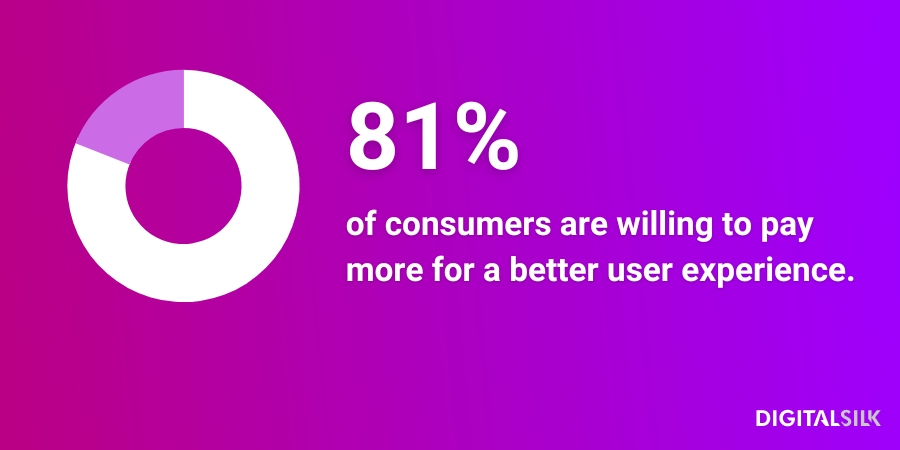
7 Best General B2B Lead Generation Strategies
Here are the best-performing strategies proven to bring success in lead generation for B2B companies across industries and niches.
1. Content Marketing: Attract And Educate Leads
CMI claim that over 70% of B2B marketers attribute their success to the value provided by their content.
The content you publish and distribute across channels is a representation of your brand, so focusing on content marketing to attract your target audience can be a winning strategy for your business, too.
Here are just a few reasons why content is such an effective, versatile strategy for lead generation:
- It works at any stage of the conversion funnel: Whether you’re looking to generate leads or retain existing customers, there is a content piece for that. Content is one of the most effective ways to connect with your audience and keep prospects interested in your business.
- It educates and guides your customers: B2B buyers prefer to be as educated as possible about the product they are considering to purchase. And there is no better way to educate them than through content.
- It’s extremely flexible: Most B2B marketers associate content with blog posts, but there are so many different formats of content, such as podcasts, videos, infographics, case studies and so on. Because of this variety, you can tailor your content strategy to the core competencies of your business and the needs and goals of your audience.
Depending on your industry and expertise, you could use content marketing to attract, engage and educate leads with blog posts, case studies, white papers, industry reports, scientific studies, podcasts, interviews, presentations, tutorials, masterclasses, webinars, conferences and more.
2. PPC Advertising: Place Your Offer In Front Of Your Leads
PPC advertising in B2B marketing is trickier than in B2C. The search volumes are smaller and the cost per click is higher.
Still, if executed correctly, PPC advertising could be an effective lead generation strategy for the following reasons:
- It allows for narrow targeting: The more you know about your target audience, the better targeted campaigns you can create. PPC advertising makes this easier for you. Thanks to the countless targeting options, you can make sure that your ads will reach your ideal customers.
- It’s cost-effective: To this day, PPC advertising remains one of the most affordable and cost-effective B2B digital marketing options. The average cost-per-click (CPC) for the B2B market is $3.33, which is far from the highest rates ($6.75 for legal services).
- It’s easily scalable: PPC advertising provides the most flexibility whenever you need to scale your business-to-business marketing campaign up or down. You can regulate your short-term and long-term spending with only a few clicks – which is very convenient in the dynamic B2B market.
PPC ads are great for generating more leads because:
- PPC traffic has a 50% higher conversion rate than organic traffic
- General stats for PPC in B2B state that the average CTR is 2.41% and that 65% of companies are acquiring B2B customers through LinkedIn paid ads
- In total, 78% of marketers advertise on Google Ads and social media while LinkedIn has 14.6% of the PPC market share
In terms of what’s in store for PPC in 2023, when it comes to B2B lead generation:
- Artificial Intelligence: Machine learning can help you identify the bids that drive the most traffic, can predict the CTR of ads and how successful they will be in obtaining quality leads.
- PPC Automation: Automation can help you target the optimal demographics for every ad campaign and potentially cut down advertising expenses.
3. Video Marketing: Easily Engage Your Leads
95% of B2B buyers say video plays a crucial role in their purchase decision.
B2C marketers have already embraced video marketing as one of the strategies with the most potential. Now, B2B marketers should follow along.
Video is one of the most consumed content formats on the internet. It’s only natural that it would find its way into the devices of your prospective and current clients.
Here’s why a video B2B marketing strategy could be a way for you to reach potential buyers:
- It’s the easiest way to get information: B2B buyers love information! Just like content marketing, video marketing is a great way to not only inform and educate your leads but also to entertain them.
- It’s great for engagement: Engagement is something that’s missing from other B2B marketing strategies. And that’s a shame because just like B2C customers, B2B buyers would love to engage with their peers over a nice piece of presentation, webinar or other content. Video is a great way of achieving that.
- It’s versatile: Scroll through the first page of YouTube and see how many different video formats there are. “How to” guides, “Best of” roundups or even simple updates. The good news is all those formats are suitable for business-to-business marketing, too. Plus, video content can be easily adapted into other formats, such as podcast episodes or articles.
4. LinkedIn: The Most Effective Platform For Acquiring B2B Leads
LinkedIn is a powerful tool for B2B lead generation and still one of the most effective platforms for business-to-business companies.
CMI research shows that 93% of B2B marketers are using this platform as an important part of their content marketing strategy.
Let’s look at the numbers:
- LinkedIn is the most effective social media platform for B2B lead generation, according to 77% of B2B content marketers
- 78% of businesses that use social selling outperform companies that don’t use social media, while over half of B2B buyers are using LinkedIn to make a purchasing decision
To make a decision based on LinkedIn posts, B2B buyers typically follow companies of their interest and, specifically, their founders and C-Suite executives. So, to build trust and grow your credibility organically, start publishing relevant posts, insights and experience-based articles on LinkedIn.
For paid options, you can use LinkedIn Sales Navigator as an effective tool for a warm outreach to sales qualified leads. With advanced search filters and personalized algorithms, it’s a tool that can help you easily identify and reach decision-makers at targeted companies.
5. Social Media Marketing: Encourage Faster Purchasing Decisions
Even with LinkedIn leading the way, you shouldn’t neglect other social media channels because 75% of B2B buyers use social media to make purchasing decisions.
Other channels may be tricky to master for something other than brand awareness.
Still, there are a few key benefits that set social media marketing apart from other B2B lead generation strategies:
- It’s an easy way to get exposure: Ask yourself – have you ever looked up whether a certain company was on Instagram? An established social media presence is one of the easiest ways to put your company and your brand out there. And B2B scroll as much as everyone else.
- It gives your brand personality: One of the key elements of establishing a connection with your target audience is being relatable. Truth is, there is a human face behind every B2B company. Social media is a great tool for you to show yours to the world. Plus, engage your subject matter experts (SMEs) and make them a personification of your brand to grow your credibility and trust.
- It’s great for sharing your content: Out of all B2B marketing strategies, social media marketing is the one that compliments content marketing the most. Blog posts and visual content are easily shareable for you and easily accessible for your audience on social media.
Social media B2B trends that are expected to take over in 2023 are:
- Using closed groups and engaged communities to cultivate interactions
- Micro-influencers and word-of-mouth marketing
- Blending marketing and sales on social media for lead nurturing
6. SEO: Vastly Underused Yet Among The Top Three Sources Of B2B Leads
Investing in SEO and building brand authority is a long-term strategy to lead generation success.
SEO is becoming a holistic, user-intent driven process reliant on the expertise, authoritativeness and trustworthiness (EAT) of the brands, as well as their content.
HubSpot found that B2B companies are getting 14% of their leads from SEO, placing it in the top three lead sources, but they are only investing 12% of their budget into it.
Other studies on B2B SEO revealed that:
- 89% of B2B buyers use the internet during the B2B research process and 71% of them begin their research with a generic search term
- 65% of the workforce are self-serve B2B buyers who prefer to conduct the larger part of their digital journey anonymously through search engines, making SEO efforts all the more important
- For 72% of B2B marketers, the most productive SEO tactic is the production of useful content
Some of the trends for using SEO as a B2B lead generation tactic include:
- Focus on credible content: Content will need to be more relevant and helpful to rank better. Updates like BERT will continue to push brands toward less SEO and more value in their content.
- Consider off-page SEO: Off-page strategies like link building will continue to play an important role in SEO, but we can expect Google to become better at spotting black hat tactics.
- Use mobile SERP visibility: Google will continue to test and implement different types of in-search query resolutions such as FAQs.
7. Email Marketing: Cold Outreach Is Still The Most Popular Tactic
Email marketing has an average ROI of $44:1 or 4,400% and if you include A/B testing in your campaigns, the ROI can rise up to $48:1.
Email is a tried and tested tool that needs no introduction. Apart from the fact that it generates a ridiculously high ROI.
And more, with the introduction of WordPress email marketing automation plugins, this ROI will skyrocket over time.
And automation options take this bulletproof tool to the next level. In case you don’t feel like reinventing the wheel, here are the key benefits of email as a strategy for generating leads:
- It’s universal: In 2022, the number of email users worldwide reached 4.258 billion and is predicted to reach 6 billion by 2025. So even if your target audience is as small and niche as it can get, you can still find the right contacts and reach out via email. In this sense, email cold outreach is, arguably, the most universally accepted lead generation tool.
- Its personalization possibilities are almost endless: Nothing beats email when it comes to personalizing the message you send to your audience. With targeted email sequences and automation, you can easily create individualized content for each segment of your audience.
- It’s the most popular lead generation channel: 79% of B2B marketers consider email the best channel for content distribution.
- It’s also underused: 59% of B2B companies don’t use any form of email marketing despite its known effectiveness.
Email will continue to generate a massive amount of leads and help conversion rates, considering these stats:
- Email converts 40x more effectively than Facebook
- Marketing emails impact the buying intent and decisions of over 50% of customers
- 59% of B2B marketers consider email as their top-performing channel for revenue generation
Some of the biggest email trends for generating leads in 2023 are:
- Minimalistic layout design to make loading time faster
- Crisp design with optimized images and reflective elements
- Mobile-first emails will be on the rise as 41% of emails are opened on mobile devices
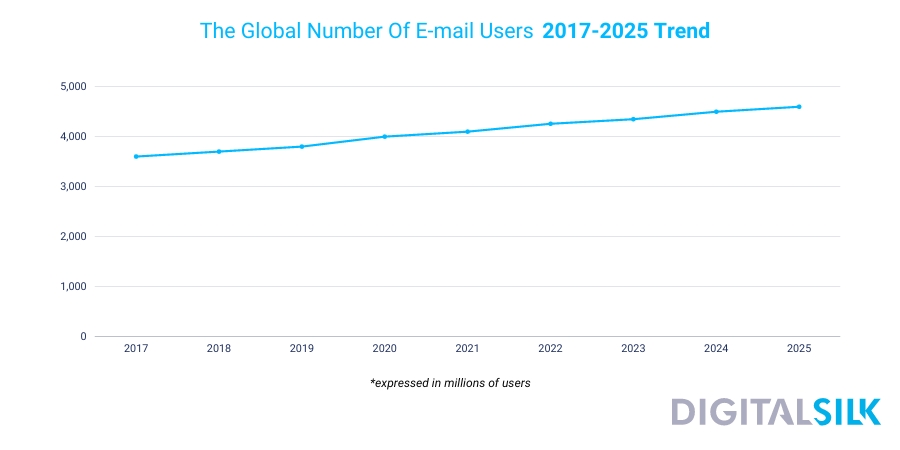
7 Best Lead Generation Tactics For B2B Service-Based Businesses
Whether you own a graphic design studio, offer legal services, run a web design company, full-service digital agency or any other service-based B2B business, here are the tried and tested tactics that will help you continuously attract potential new clients.
1. Consistent Blogging: Get More Leads Continuously
Still haven’t started blogging regularly on your B2B website?
Here’s why you should:
- B2B businesses with a blog generate 67% more leads than those who don’t have it
- B2B companies that publish 16 or more blog posts per month get 4.5 times more leads than companies who publish 4 or less
- 53% of B2B buyers read 3 to 5 articles or other pieces of content before reaching out to sales
Here is what professionals say — listen to Emma Debeljak, Head of Content at Digital Silk.
Blogs can fit into every stage of the sales funnel:
- At the top of the funnel, create posts that capture your audience’s attention and build interest by addressing their needs or pain points.
- At the middle of the funnel, create lead magnet blog posts. You have addressed your audience’s pain points and gained some brand awareness, now offer solutions to turn your visitors into leads. Offer free lead magnets as downloadable documents or exclusive newsletters, trials and other freebies in-post.
- At the bottom of the funnel, your audience is brand-aware and interested. Create blog posts that tip them over the lead-customer threshold by helping them make informed decisions. Position your products or services as the best solutions to their problems, compare your offering to others on the market and offer valuable insight.
To generate leads, focus on the top and the middle of the funnel and adjust your blog posts accordingly.
Check out this video where Emma Debeljak shares how blogging can play a role in your conversion funnel:
Keep in mind that 96% of B2B buyers want to see well-researched blog posts, written from a standpoint of authority. So, make sure to include experts in the writing process even if it’s only through an internal interview between SMEs and the writer.
Now, here are some of the 2023 blogging best practices and ideas for B2B lead generation:
- Include CTA buttons in your posts that funnel traffic to the conversion pages
- Use the keywords your prospects use to describe their needs and problems
- Chose topics that solve your audience’s problems and help them learn about your services
- Conduct industry research and share insights within a blog post to position your company as an authority in your field
2. Lead Magnets: Thought Leadership Can Do Wonders
A lead magnet is a value-rich incentive you offer prospects in exchange for their contact information.
To make the most out of it, don’t create something your potential clients can find elsewhere. It should be something based specifically on your expertise, study, insights, research, knowledge, experience, etc.
A lead magnet can be downloadable:
- Checklist
- E-book
- Case study
- Template
- Report
- White paper
- Guide
- Slide deck
This list is not exhaustive, of course. The lead magnet type will depend on your specialties.
When you make lead magnets part of your thought leadership campaigns, qualified leads might just keep pouring in as they’d find your documents to be proof of your authority within the niche.
This will make it easier for them to trust you and turn to you when in need of solving problems you’ve already proven you know how to solve.
3. Client Reviews: Manage Your Online Reputation To Earn Trust
Only 20% of B2B companies are using reviews as part of their marketing strategy.
On the other hand, the same study showed that 92% of B2B decision-makers are more likely to make a purchase after reading trusted reviews.
This means that managing your reputation and nurturing authentic reviews from your previous clients could be your opportunity to stand out from the crowd.
Client reviews are one of the most important elements of your online reputation. They provide social proof which is a powerful tool for lead generation.
You can publish client reviews on your website, but don’t neglect the benefits you might gain from submitting your company to online business directories and ranking platforms like DesignRush, Clutch, G2 and others.
Business owners and decision-makers frequently browse these platforms to find services and solutions for their projects. To increase your chances of attracting such valuable leads, set up a complete profile with verified reviews on each of the platforms.
Besides getting exposed to new, highly qualified audiences, this can also help you gain wider recognition in your industry.
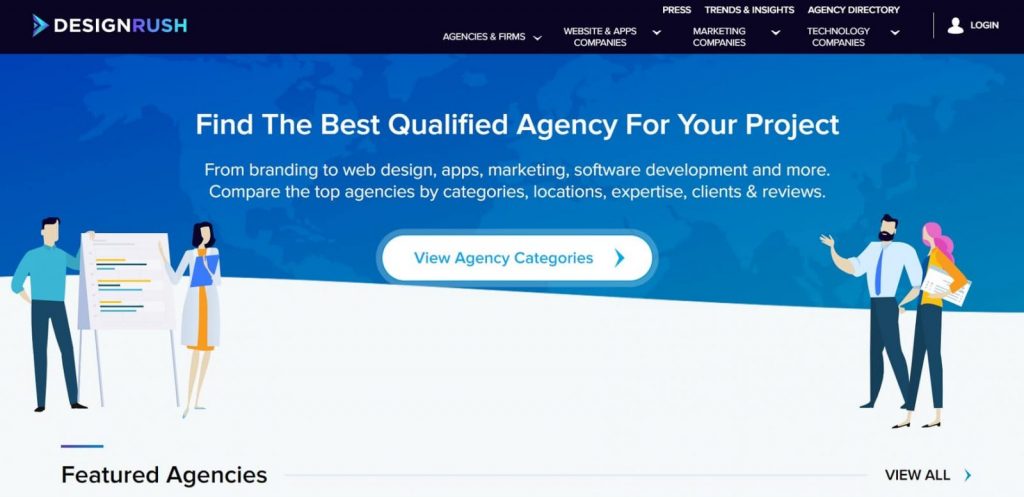
[Source: DesignRush]
4. FOMO: A Powerful Tactic For B2B Buyers
The sense of urgency that the fear of missing out (FOMO) creates is real: 56% of users are afraid that they will miss out on what’s happening on social media.
Even more dramatically, 69% of Millennials experience FOMO and 60% make purchases because of it.
That is not to say that FOMO only affects this demographic. This tactic appeals to our basic need for inclusion and our fear of making a wrong decision. As such, it affects everyone, but its impact seems to be the strongest among digital natives, mainly due to social media.
You can use various FOMO techniques to attract more leads. Here are some of the prominent ones for 2023 and the years to come:
- Time-limited offers (ex. “40% off until the end of the month”)
- Testimonials and other social proof on landing pages
- Live sales updates (ex. “5 people are looking at this product”)
- Highlighting missed opportunities so that next time users will be on high alert
- Live inventory updates (ex. “only 3 seats left”)
- Live countdowns for offer expiration
Out of these, customer testimonials and case studies are the most effective B2B marketing tactics, according to a B2B Content Marketing Trends report.
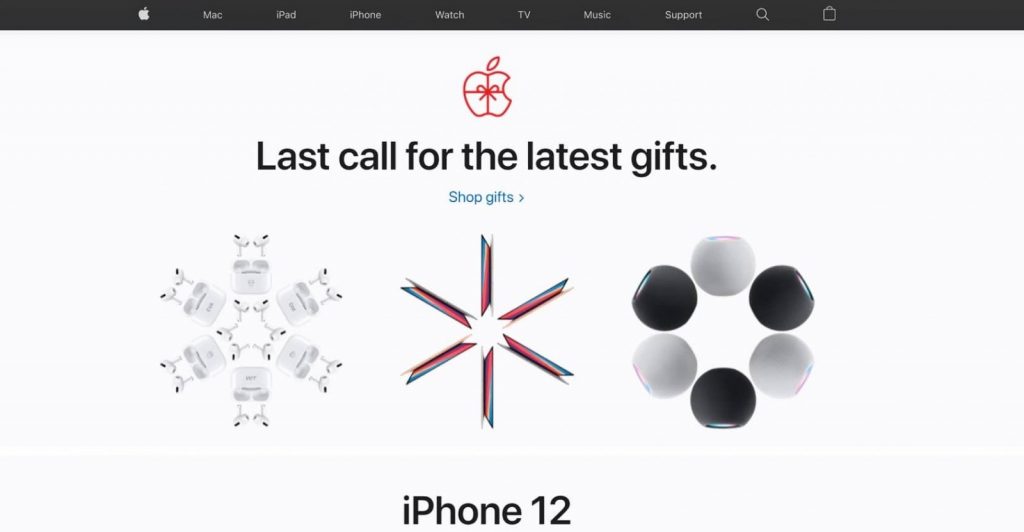
[Source: Apple]
5. Landing Pages: Increase Conversions With On-Page Optimization
When we say on-page optimization, we don’t mean only on-page SEO with alt texts, meta titles and descriptions, but also a landing page specifically optimized for conversions.
68% of B2B tech businesses already use strategically optimized landing pages to acquire leads.
But how, exactly, do you optimize a landing page?
The biggest landing page trends that can help you attract more leads include:
- Videos: Adding a video to your landing page can increase conversions by as much as 86%
- Compelling headlines: Titles with a question are expected to be on the rise as they can generate 14.1% more click-through than other types of headlines
- Providing value to the visitor, such as a free e-book, on-demand webinar or a special discount for the conference you organize
- Clear, engaging and easily relatable copy throughout the page
- Distinctive calls to action as visual cues to guide visitors to the next steps
- Distraction-free page layout cleared of the website header, footer, sidebars and navigation
- Well-designed “Thank you” pages as a final touch for those who download your documents, subscribe to your newsletter, register for your event or perform other actions
If you serve different audience groups, you can design specific landing pages to address them separately. This way, you can adjust audience language, pinpoint specific problems you solve and help your prospective clients immediately understand your unique value proposition.
6. Pop-Ups: Boost The Number Of Qualified Leads With Strategically Positioned Pop-Ups
Try not to overwhelm your potential clients with a dozen pop-ups that appear the second they enter your website.
Instead, position those pop-ups strategically throughout the site to ensure your visitors get the right message at the right time. This will increase the personalized approach and help your potential leads gain more trust in your brand.
You can use some of these tactics:
- Exit-intent pop-ups triggered when someone hovers over the “Back” or “Close” buttons: These can be good for a newsletter opt-in, upcoming webinar registration, free trial, website audit or a special offer
- Time-based pop-ups that appear after a certain period of time: These can be a nice solution for “Download special report,” “Get our free guide” and similar pop-up messages
- Scroll-triggered pop-ups that appear after visitors have started scrolling down the page: These can be good for asking visitors to choose between options that will lead them to a personalized landing page
- Click-activated pop-ups triggered by a click on a specific area or a button: These can be a great solution for triggering a notification about a special offer that applies only to visitors interested in a specific category on your website
Whichever you choose, keep user experience in mind and don’t make your pop-ups intrusive, annoying or overwhelming. Also, don’t block the whole page with a pop-up and always provide the option to close it without any other interaction.
Following these tips can help you increase your pop-up click-through rates (CTRs) and gain more valuable leads.
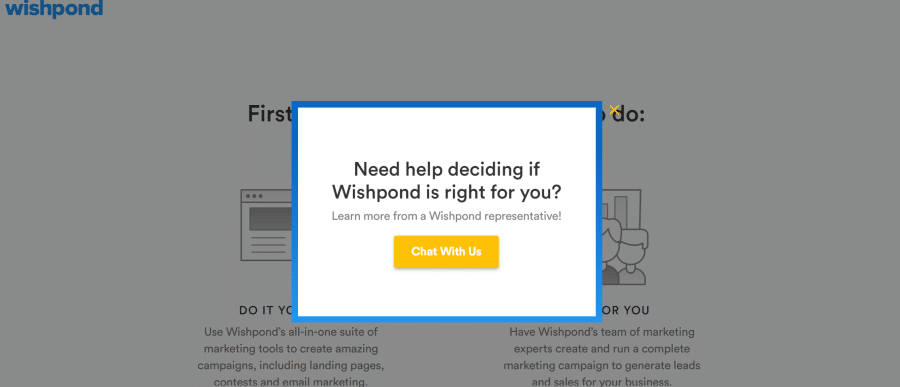
[Source: WishPond]
7. Quality Backlinks: Drive More Qualified Leads Via Organic Search
93% of B2B content gets no external backlinks. Aiming to be in the successful 7% can pay off big time.
One of the greatest benefits of link building for B2B service-based businesses is organic traffic growth.
Some of the most effective tactics of link building are:
- Backlinks from .edu and .gov sites because Google sees these as trustworthy and authoritative
- Wikipedia links as another high-authority referring domain
- Affiliate link building
- Highly sharable content such as infographics
- Guest blogging
- Help a Reporter Out (HARO) service
Experts like Semrush point out that search engines discover pages to crawl and index by following backlinks. The sooner your page is discovered, the faster it will be crawled and ranked.
According to Backlinko’s research of 1 million Google search results, pages with more backlinks tend to rank higher than pages with fewer backlinks.
7 Best Lead Generation Ideas For B2B Tech Brands
If your B2B business is a SaaS company or you offer business automation software, robust on-premise hardware equipment or any other tech solutions to businesses and enterprises, these are the best techniques you can use to identify and attract qualified leads.
1. Explainer & Demo Videos: The Most Effective Lead Generation Strategy For SaaS
Videos help 90% of users make a buying decision, while 64% of users said that watching a video brought them closer to buying.
B2B tech companies are quickly embracing this channel. With 79% of consumers reporting that watching a video has tipped the scales in favor of buying a software or an app, tech companies will certainly continue using demos, tours and explainer videos to:
- Increase the number of activated free trials
- Ease the onboarding process for users who just started a free trial
- Lower the churn rate of users who abandon the product after a free trial
- Increase brand awareness and attract more leads with to-the-point and easy-to-follow tutorials and help documents
- Fortify the existing customer relationships by keeping them in the loop of the new features and the latest developments
Video trends in B2B tech marketing for 2023 include:
- Video will be the favorite way of learning about new products for 68% of the audience
- Explainer videos will be the most popular type, while 360-degree showcase video, interactive videos and similar formats will be on the rise
- There will be a LOT more demand for live videos. As a result, more companies will include live streams in their video strategy, hold webinars, virtual events and other types of content that builds trust, provides value to their business prospects and generates leads
Still not sold on video as a tactic for tech brands?
Consider these stats:
- 1 in 4 clients lose interest in a company that doesn’t have a video and 4 in 5 consumers say it is very important for a B2B company to have a video that shows how a product/service works
- B2B marketers that use video marketing grow company revenue 49% faster than those who don’t
- Video marketers get 66% more valuable leads per year
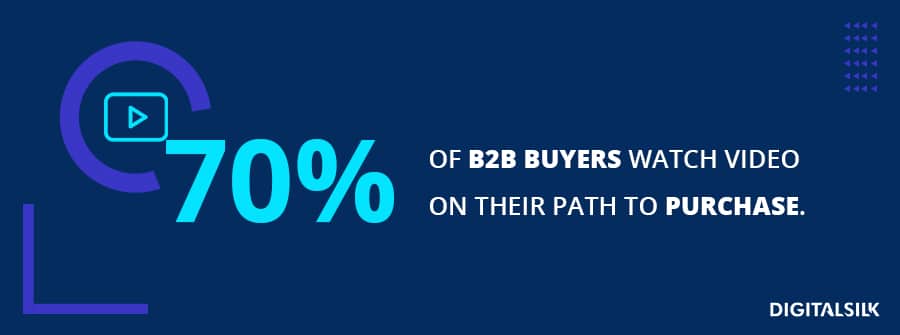
2. Frictionless Experience: Make The Onboarding Process Quick And Easy
Friction on your website can be anything from a broken link to overcomplicated sign-up forms.
To remove friction, make sure that everything on your website is functional and ensure that processes are simple and smooth.
The best practice is to:
- Have clearly defined user journeys
- Test website usability with your target audience
- Adjust user flow on your website to provide a seamless experience
For example, if you offer a free trial, make it possible for interested users to sign up and start using your product as soon as possible. If it’s not absolutely necessary to have a longer registration form, simplify it and ask only for the essential information.
Making the onboarding process quick and easy will help you reduce the churn rate, as well as the number of users who abandon the process because of too many required steps. Plus, it can increase the number of satisfied users who can quickly turn from leads to happy customers.
3. Mobile Marketing: Still Underused, Yet Half Of All Internet Traffic Is On Mobile
2019 was the tipping point that saw mobile traffic account for half of all internet traffic across the globe.
In 2020, we saw mobile overtake desktop in internet usage.
Other stats to keep in mind in 2023:
- 87% of internet users are using mobile phones, while 43% of product research is done on mobile
- 50% of emails are opened through mobile devices, creating opportunities for B2B lead generation through email marketing automation and newsletters
- 80% of B2B buyers use mobile devices for research at work
- Also, mobile usage per B2B worker will increase by 50% during the course of the year.
- 49% of businesses still do not use mobile marketing in their campaigns! (Source: Campaign Monitor)
In 2023, some of the B2B mobile marketing trends will include:
- Mobile ad platforms will provide better location-based targeting
- 5G will create opportunities for faster and smoother interactions, as will HD AR, VR and other video experiences
- Marketing automation will continue to help businesses offer hyper-personalized services to B2B customers, such as live chat on mobile, suggested products, etc.
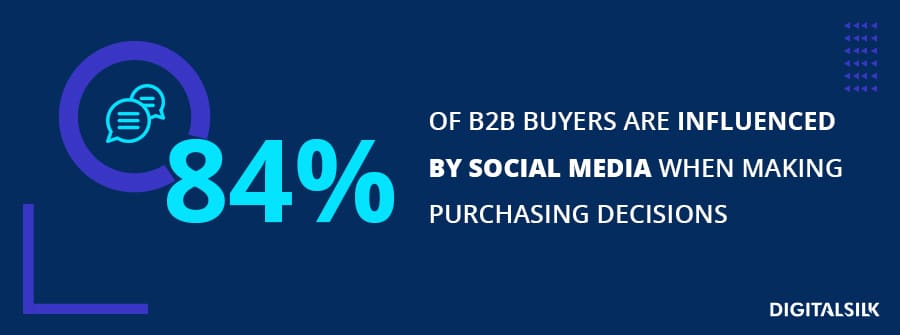
4. Search Marketing: Attract Your Competitor’s Audience
Although optimizing content for organic search provides the biggest number of sales qualified leads, search marketing is one of the most effective long-term tactics for generating B2B leads.
Because 93% of B2B buying processes begin with an online search.
Search marketing can boost online presence via paid campaigns in search engine result pages (SERPs) and help you capture leads the moment they start searching for products or services similar to yours.
To make your search marketing strategy even more effective, you can observe what your competitors are doing in their paid search ads – which keywords do they target, do they offer any special deals?
You can monitor and tap your competitor’s audiences with:
- SimilarWeb, SpyFu and other web analytics tools: These market intelligence tools give you insights into your competitors’ web performance and insights into their audiences. You can use this info to build search campaigns targeting their users.
- SEMRush, Ahrefs, Moz and other SEO tools: These give you insights into your competitors’ keywords and SEO strategy, allowing you to discover their strengths and shortcomings.
Beating competitors at their own game is possible by launching PPC search campaigns that provide better deals to the same audience.
5. Retargeting Through Display Ads: Entice More Website Visitors To Make A Purchase
Retargeting through display ads for B2B companies outperforms display ads in B2C sector by 147%.
Retargeting works particularly well for tech brands because they typically operate in saturated markets, so boosted visibility is a welcome addition.
You can gain better results with this technique because:
- Retargeting ads have 10 times higher clickthrough rates than regular display ads and they convert up to 70% of visitors
- 54% of B2B marketers are excited to use retargeting in spaces that are highly engaged, like social media, as a way of generating new leads
B2B remarketing tactics to consider in 2023 include:
- Email drip campaigns for new leads
- Email campaigns with new offers for leads of high value
- Retargeting Google Ads search campaigns
In addition to off-site retargeting, which means serving ads to the users who leave the site, businesses should also consider on-site retargeting. It reinforces the user’s purchase intent while browsing through your offering.
On-site retargeting tactics include:
- Micro or soft conversions: Send your leads exclusive and insightful newsletters, discounts, coupons and gifts to incentivize them to maintain interactions with your brand.
- Personalization of messages: Communicate relevant messages to each audience segment and potential B2B partners from different verticals to give them more value and incentive to restart their customer journeys.
6. Chatbots: Engage Every Single Lead That Comes Your Way
Conversational marketing is the name of the game for 2023.
Conversational marketing is a feedback-oriented digital marketing tactic that provides a unique experience to every customer at every stage of the conversion funnel. It is used to drive engagement, acquire leads and grow the customer base.
Basically, it’s moving customers through conversion funnels via real-time conversations.
How can chatbots help in business-to-business lead generation?
- Chatbots can save up to 30% in customer support expenditures and users generally prefer chatbots over apps when interacting with companies
- Studies show that B2B companies use chatbots more often (58%) than B2C (42%), usually in the first step of the lead generation process
Chatbots are a great way to capture leads for your digital product, app or SaaS business as they can help you engage every single potential client that visits your website.
Chatbots are available 24/7 and research shows that it is vital to respond to a lead within 5 minutes or, ideally, 5 seconds! Similarly, a joint Amazon Web Services (AWS) and Enterprise Strategy Group (ESG) study suggests that 87% of users expect an immediate response.
By using artificial intelligence to interact with customers, chatbots answer their queries, help them get the right information and prolong their time on-site. This way, conversational marketing can help you collect leads’ contact info and other relevant data.
One of the main conversational marketing traits in B2B according to Drift’s Dave Gerhardt is that they can add value to businesses by balancing the “signal to noise ratio,” meaning it skips preliminary conversations and gets to the sale talk immediately.
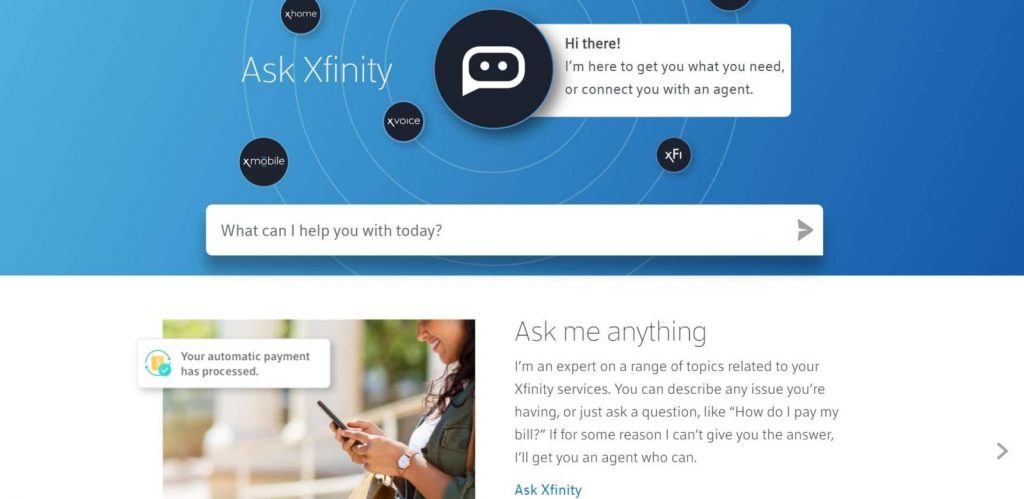
[Source: Xfinity]
7. Dynamic Web Pages: Personalize User Experience For More Leads
You can create a dynamic home page on your website with gamified elements that will get visitors on a “choose your own adventure” kind of journey.
Or, you can create landing pages that will segment your audience automatically based on their location, time zone, previous sessions or the type of interaction they already had with your product.
You could also create a simple form that asks visitors for their industry, company name, position and interests to present them personalized content they could benefit the most from. This works particularly well if you offer a wide range of solutions or a large library of helpful resources.
Displaying personalized content to convey clear messages that speak directly to your ideal users is one of the most efficient B2B lead generation tactics. It makes the buying process easier and helps you build stronger bonds with leads and potential users.
Developing A B2B Lead Generation Strategy: Things To Consider
Before developing a specific business-to-business lead generation strategy, you should consider the following aspects of your business.
1. Market & Audience
Perform market research to gain relevant information about the trends and changes in your industry, niche and products category.
Next, define your target audience as specific as possible, create buyer personas to represent your ideal users or client and conduct research to learn all about their needs, wants and problems you have to solve with your offers.
The more you know, the easier it will be for you to convey clear messages and encourage your potential customer to choose you over competitors.
2. Goals & Expectations
Set clear, achievable and measurable goals for your business growth, marketing campaigns, sales targets and – specifically – lead generation. Then, make sure that those goals align with each other, both short-term and long-term.
In other words, what are your business goals and how will your marketing strategy help you achieve them? And, how will your lead generation strategy help you grow sales?
Creating a roadmap with action plans and outlined tasks for each of the strategies will help you see a bigger picture and start executing strategies more efficiently.
3. Tools & Tactics
Break down your lead generation strategy into smaller tasks to start implementing it into your daily schedule.
What will your approach to implementing this strategy look like?
If your goal is to attract more leads, the next steps would be to identify those leads, find the best channels for contact, write personalized messages (or ads) start applying the tactics to attract them and engage with your offers.
4. Metrics & KPIs
How will you track the performance of your lead generation campaigns?
And, most importantly, how will you know they are successful?
This is where you specify conversion goals and assign values to track the success of your efforts.
For lead generation, this would be the number of qualified leads you gained with a specific campaign. Depending on the type of your lead magnet, it could be the number of people who signed up for a free trial, a newsletter or requested a demo.
5. Performance & Optimization
An effective strategy is all about continuous improvement.
It’s not enough to simply launch your campaign, sit back and watch the clients pour in.
You should be ready to commit enough time and resources to constantly monitor and improve the performance of your campaigns.
This way, you will be able to identify potential issues before they appear and ensure that each campaign is delivering its maximum performance.
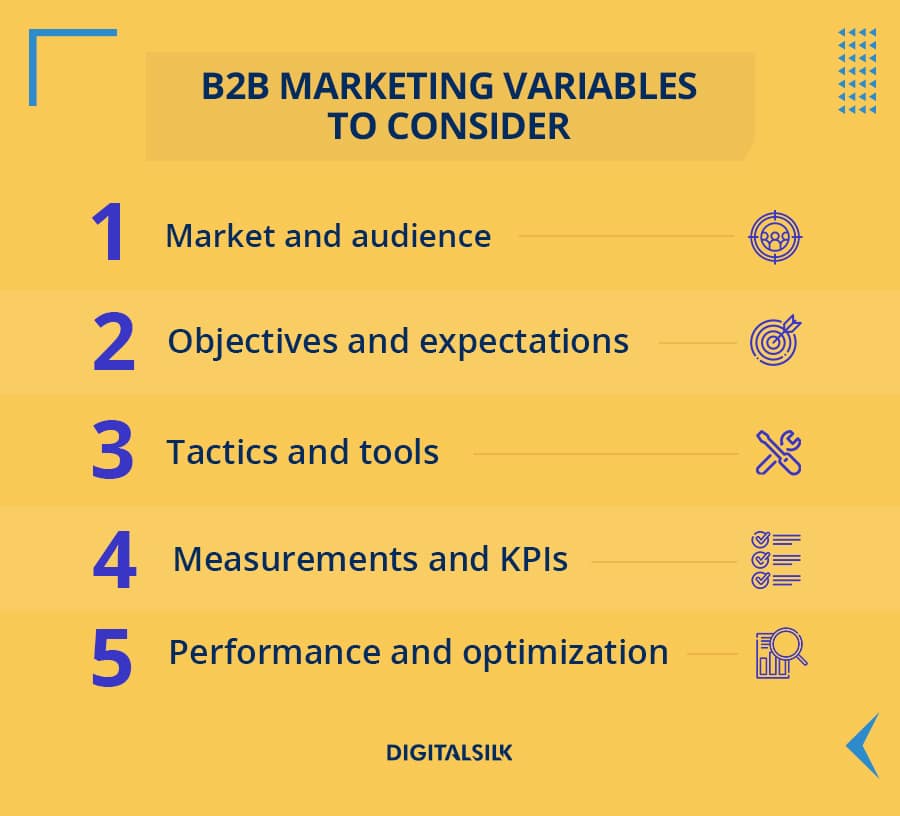
Which Lead Generation Strategy Is Right For Your Business?
How do you know which lead generation strategy is right for your business?
To achieve outstanding results with your B2B lead generation strategy, you have to implement elements from various tactics. However, the exact mix of strategies and tactics you should use will depend greatly on the goals you want to achieve.
You can choose a combination of tactics and strategies that suit your business, industry and channels the best.
Lead generation belongs to the middle or the bottom of the conversion funnel, which means that your prospective clients are already aware of your products or services.
Takeaways On B2B Digital Marketing Strategies For Lead Generation
Some of the main takeaways on B2B lead generation via digital marketing are:
- There is a lot of untapped space in B2B digital marketing such as blogging, mobile use and SEO
- There are certain lead generation strategies, such as retargeting and email outreach, that have very high conversion rates
And, of course, having a website that is optimized for conversions is a crucial prerequisite to each one of these tactics and techniques.
Keep in mind that lead generation is a marathon, not a race. As long as you monitor the performance of your strategy, you’ll be able to optimize it along the way to make sure it brings maximum value to your business.
B2B products and services often require a long-term commitment, which is why your leads will strive to make well-informed purchase decisions. Support them in the process and you’ll have yourself plenty of happy customers!
"*" indicates required fields




